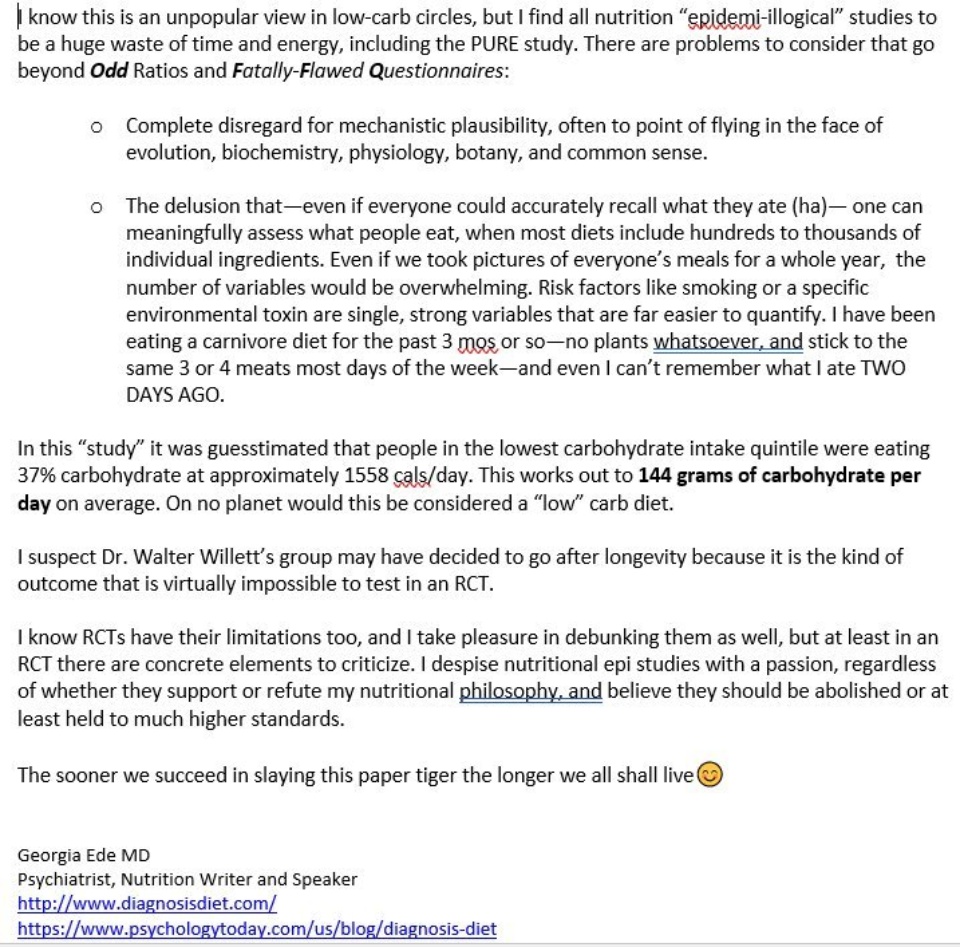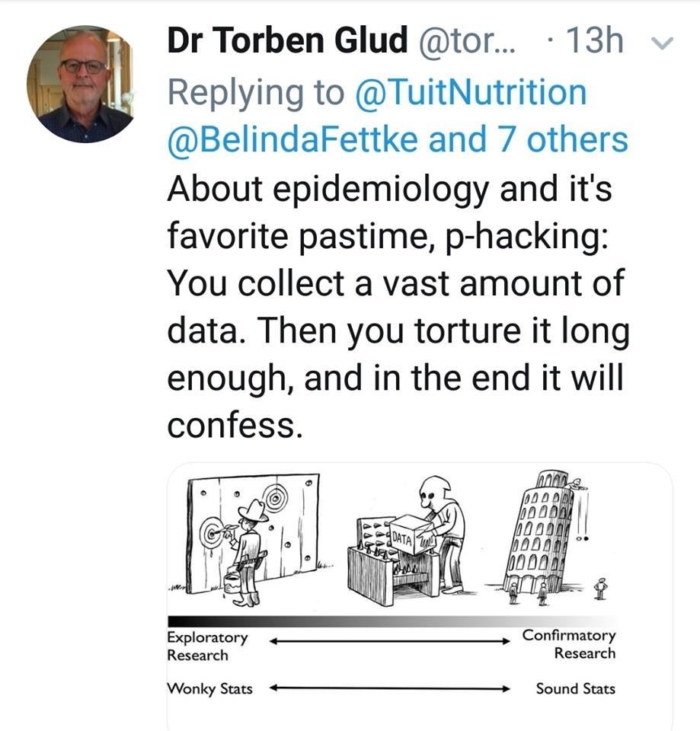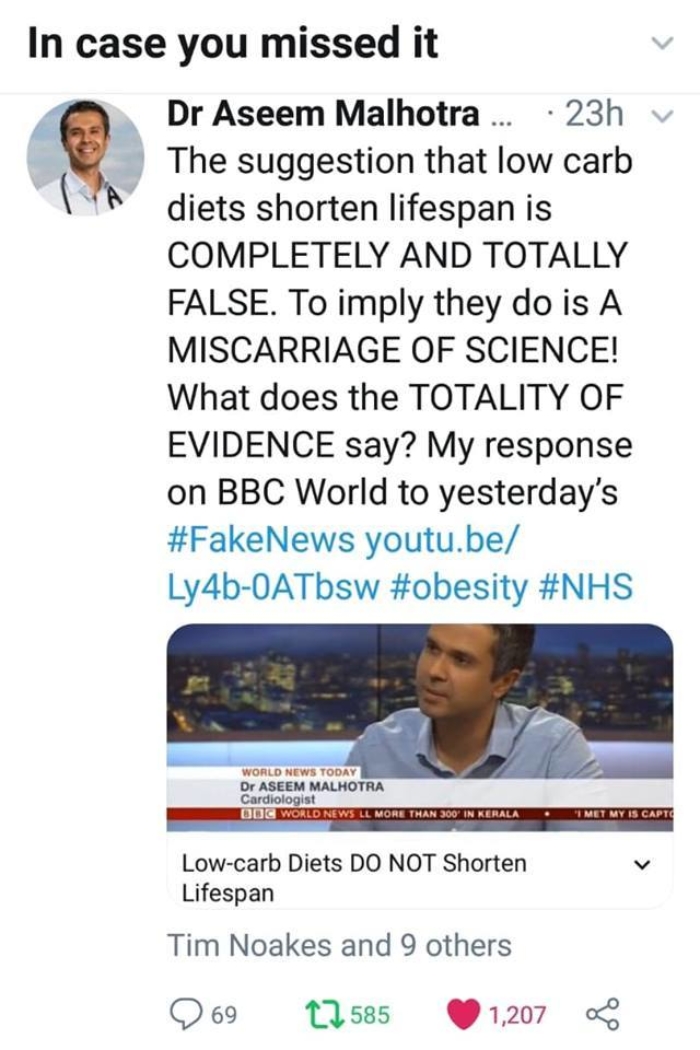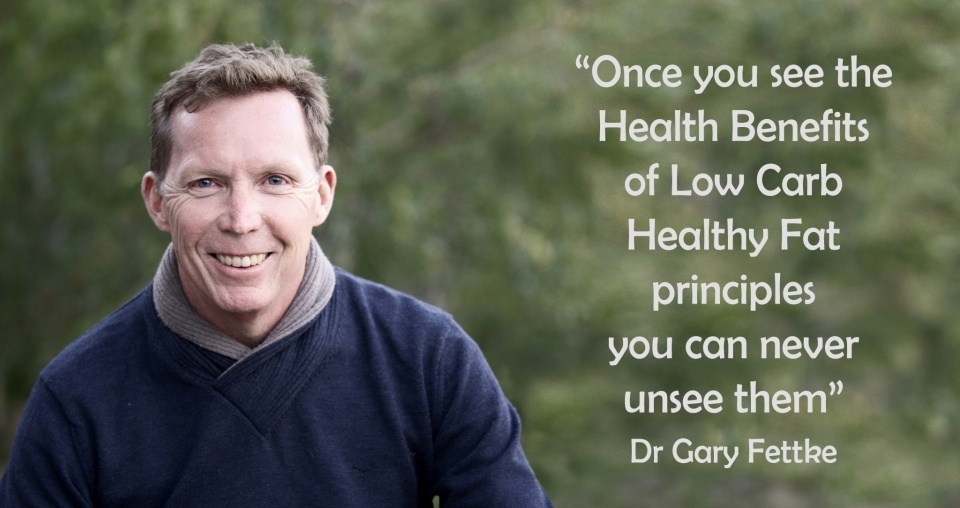Well, there is one thing for certain ... telling Low Carber's that their lifestyle will harm them gets an entire community riled up! Thank goodness the Low Carb Thought Leaders around the globe are actively debunking the ridiculous study claims, and dismissing newspaper headlines, that falsely suggest that Low Carbohydrate diets compromise health and longevity.
It appears the Food Industry is using the Tobacco industry playbook to fight Low Carb with full force. Not only was the data cherry-picked from a Food Frequency Questionnaire that lumped 'meat in with the cakes and baked goods' category while dairy, fruit, and vegetables were all kept as separate entities (implying that meat is a discretionary and unhealthy food??), they also excluded anyone who became metabolically unwell over the 25 year period since the study began (but not from baseline).

I received a message from a political publicity relations manager today telling me that; it was quite apparent to him the Low Carb story was planted. He believes that it was fed to sympathetic or co-opted journalists because; "The simultaneous appearance across a wide variety of news sources is the most obvious reason. It's not just coincidence and since it's a health story with a very particular slant, it is not something journalists just picked up from a newswire. Unfortunately #fakenews is nothing new, and in fact has been quite prominent since newspapers first emerged.
He concluded; "the difference is, that in the past journos used to at least make an attempt to look unbiased."
Both sides of the argument were not been presented in any way shape or form in the media. There has been no opportunity for a right of reply from anyone in the Low Carb community except as a rebuttal online.
It has certainly been our experience with the media these last few years. Over and over we find Low Carb is ridiculed and called a 'Fad Diet' by the Dietitians Association of Australia and their spokespeople, calling it is unsustainable and expensive, but of course it's neither!
Recently we discovered that advocates of Low Carb in Australia (including Gary) have become targets for 'Active Defence' by the cereal industry as outlined in Maryanne Demasi's recent article.
Active Defence
In this article I will share examples of the flawed Science and misdirected claims from the epidemiological study from leading Low Carb experts around the world including; Dr John Schoonbee, Dr Aseem Malhotra, Prof Tim Noakes, Dr Georgia Ede, Dr Angela Stanton, Dr Ken Berry and Richard Morris, an Aussie guy who has turned his own life, and health, around implementing Low Carb/Keto principles.
I find it fascinating that 'Low Carbers' have been given no right of reply in print media, anywhere, despite the research and results being achieved ... hence the reason we have to use blogs and Social Media platforms to have a voice. Please share and #benoisywithme
Even though umbrellas are strongly associated with rain, they do not cause rain!

John Schoonbee, Global Chief Medical Officer at Swiss Re, addressed the Low Carb study on LinkedIn. "In the summary of the article, the word "association" occurs 6 times. The words cause, causes or causal are not used at all (except as part of "all-cause mortality")
Yet the headlines in various news outlets are as follows:
BBC : "Low-carb diets could shorten life, study suggests"
The Guardian : "Both low- and high-carb diets can raise risk of early death, study finds"
New Scientist : "Eating a low-carb diet may shorten your life – unless you go vegan too"
All 3 imply active causality."
No implied causality from The Sydney Morning Herald : People on low-carb diets die younger, says science shouted the Aussie headlines, claiming that "Pasta lovers rejoice: people with a high-carb diet live longer than those on a low-carb diet, a study has found."
Bad Science
Dr Angela Stanton
Angela Stanton (PhD) cleverly pulls apart the latest flawed study and shares the many errors in her article 'When Bad Science Can Harm You'. It appears the authors of the study manipulated the data to fit their hypothesis.

Not only did the authors of the study collect data on carbohydrates documented from the first and third visits and estimate participants continued carbohydrate consumption, they excluded anyone who became metabolically unwell.
…We did not update carbohydrate exposures of participants that developed heart disease, diabetes, and stroke before Visit 3, to reduce potential confounding from changes in diet that could arise from the diagnosis of these diseases… The expected residual years of survival were estimated…
"Oh wow!" wrote Angela. "So those who ate a lot of carbohydrates and developed diabetes, stroke, heart disease during the study were excluded? This does not reduce confounding changes but actually increases them. That is because the very thing they are studying is how carbohydrates influence health and longevity, that is no diabetes, no strokes, and no heart disease. By excluding those that actually ended up with them completely changes the outcome to the points the authors are trying to make rather than reflect the reality."
Dr Georgia Ede and Dr Ken Berry
Dr Georgia Ede has put her short critique into a PDF format (attached below) and Dr Ken Berry voiced his opinion about the topic on his YouTube Channel.

Richard Morris
Richard Morris co-founder of 2KetoDudes made the following observations on Facebook "It's surprising that Walter Willett, a scientist who my Human Biology lecturer called the World's greatest living nutritionist would lend his name to such a tissue of bad observational science.
"Their low carb group ate 38% of energy from carbohydrates ... anything more than 33% marks it as a HIGH carb diet.

"The low carb group at the beginning had more smokers (33% vs 22%), more former smokers (35% vs 29%), more diabetics (415 vs 316), twice the native Americans, fewer habitual exercisers (474 vs 614).
"And how did they determine their diet? They gave participants 2 questionnaires in 25 years, and extrapolated everything else.
"It's embarrassing when a good scientist put's their name to bad science just to support the low fat anti-meat dogma his career has been founded upon.
"You know what a ketogenic diet does? It reversed type 2 diabetes in a clinical controlled trial, and it did it in my body and that of 10s of thousands of people just like me.
"And you know what life expectancy for a 50 year old type 2 diabetic is? 13.2 to 21.1 years. And along the way you'll lose toes, fingers, kidneys, eyesight, and gain an 8x increase in cardio vascular disease.
"People on low-carb diets die younger, says 'science' ..."
Dr Zoe Harcombe
Zoe Harcombe will do a complete review shortly so watch this space, but in the meantime I have summarised her recent article:-
"I will highlight what I think is the major flaw in this ‘moderate carb is best’ paper. The paper has generated irresponsible global headlines, such as “Low carb diets could shorten life, study suggests”. As epidemics of obesity and type 2 diabetes show no sign of abating, encouraging the consumption of at least half one’s diet in the form of the one non-essential macronutrient, is unhelpful, to say the least.

"The conclusion from the first part of the paper (the ARIC study) was that 50-55% of energy from carbohydrate was associated with the lowest risk of mortality. The average intake of carbohydrate in the ARIC study was 49%. The paper presented a U-Shaped curve to indicate that carbohydrate intake below 30% and above 65% was associated with the highest risk of mortality."
This is the single biggest issue behind the headlines;- The subjective group divisions introduced what I call “the small comparator group issue.” If 20 children go skiing – 2 of them with autism – and 2 children die in an avalanche – 1 with autism and 1 without – the death rate for the non-autistic children is 1 in 18 (5.5%) and the death rate for the autistic children is 1 in 2 (50%). Can you see how bad (or good?) you can make things look with a small comparator group?
"For the media headlines “Low carb diets could shorten life, study suggests” (Ref 5), the researchers applied a statistical technique (called Kaplan-Meier estimates) to the ARIC data. This is entirely a statistical exercise – we don’t know when people will die. We just know how many have died so far.
"Using the small comparator group extremes (<30% and >65%) makes the reference group look better!
"Back to the children skiing… If we were to use the data we have so far (50% of autistic children died and 5.5% of non-autistic children died) and to extrapolate this out to predict survival, life expectancy for the autistic children would look catastrophic. This is exactly what has happened with the small groups – <30% carb and >65% carb – in this study.
"The data have been manipulated."
I truly love Zoe Harcombe's work in debunking #fakenews about Low Carb and Healthy Fats.
Low Carbohydrate Healthy Fat principles improve health outcomes ... but not industry profits?
Prof Tim Noakes
Prof Tim Noakes tweeted "and this is science? If one completed a laboratory study of a dietary intervention (RCT) and said: 'well we don't actually know what they ate the last 19 years but we guess it was what we told them to eat 25 years ago' it would be rejected without any hope of recovery..."
Dr Aseem Malhotra

Dr Aseem Malhotra took it to another level in his interview on BBC World News.
Here are a couple of Key Points he outlined on Facebook:
1. Reviewing ALL the up to date evidence the suggestion that low carb diets shorten lifespan from this fatally flawed association study is COMPLETELY AND TOTALLY FALSE. To say that they do is a MISCARRIAGE OF SCIENCE!
2. The most effective approach for managing type 2 diabetes is cutting sugar and starch. A systematic review of randomised trials ... reveals its best for blood glucose and cardiovascular risk factors in short AND long term.
The take-away message is please don't believe everything that is written about the latest study to come out of Harvard T.H Chan School of Public Health. The authors/funders of this paper; Dietary carbohydrate intake and mortality: a prospective cohort study and meta-analysis paid $5,000 to be published in the Lancet Public Health (not to be confused with the official parent publication - The Lancet). While it went past an editorial committee it has not yet been peer reviewed.

I suggest you make your own observations. See how you feel adopting a Low Carbohydrate Healthy Fat Lifestyle. I have created a resource to let you know What to Expect When You Go Low Carb and also an LCHF Starter Guide.
Don't forget to take a look at Kate's article Going Against the Grain to see how to make a #lowcarb lifestyle simple and sustainable.
#benoisywithme and challenge the health and dietary guidelines if you don't think they are providing the benefits they claim to.
#wecantwait #choosehealth
